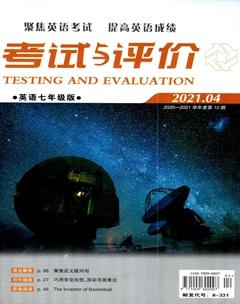聚焦反义疑问句
隋晓冉
1. 反义疑问句的基本形式
常见的反义疑问句分为前肯后否和前否后肯两种形式,即如果陈述部分是肯定结构,反义疑问句部分就用否定结构,反之亦然。附加问句部分所用代词要与前句主语一致,谓语动词在人称,数和时态上也要与前句保持一致。如:
He goes to work on foot, doesnt he?
2. 附加问句部分主语及谓语的确定
附加问句部分主语与谓语的确定应以陈述部分的主语和谓语为依据,尤其要注意一些特殊的情况。同时,附加问句部分的主语一般应用人称代词,而动词部分若为否定形式,则一般应用缩略形式。
(1) 当陈述部分的主语为this, that,则用it;当陈述部分的主语为these,those时,则用they。如:
This is a green jeep, isnt it?
Those arent banana trees, are they?
(2) 当陈述部分为I am形式时, 附加问句用arent I。如:
Im right, arent I?
(3) 当陈述部分是there be结构时,附加问句用be there。如:
There was an English film yesterday, wasnt there?
(4) 当陈述部分有never, seldom, no, few, little, nothing, nobody, hardly, none, too... to...等表示否定意义的词或短语时,附加问句部分用肯定形式。如:
He seldom goes to the cinema, does he?
(5) 如果陈述部分含有由表示否定意义的由前词缀或后缀构成的词如dislike, unfair, unhappy, careless, unlike, impossible, impolite, impossible等时,附加问句部分仍要使用否定形式。如:
She dislikes the idea, doesnt she?
Its unfair, isnt it?
(6) 主语是不定代词的反义疑问句
①当陈述部分的主语为everything, nothing, anything, something等指事/物的不定代词时,附加问句主语用it, 而不用they。如:
Everything is in good order, isnt it?
②当陈述部分中的主语为everybody, everyone, anyone, nobody, none, no one等指人的不定代词时,附加问句部分的主语通常用they或he代替。如:
Somebody wants to see you, doesnt he / dont they?
(7) 当陈述部分动词为have / has时有下列几种情况:
① have为实意动词,表示“有”时,其附加问句部分可以用have,也可用do。如:
Jim has a new radio, doesnt he / hasnt he?
② have為实意动词,表示“吃,喝,玩,度过”等意思时,附加问句部分用do。如:
All of the students had a nice time, didnt they?
③ have to表示“不得不,必须”时,附加问句部分用do。如:
Kate has to help his father on the farm, doesnt she?
④ had better表示“最好”, 附加问句部分用had。如:
Wed better not tell her about that, had we?
(8) 当陈述部分有need时,如need为行为动词,附加问句部分用do;若need用作情态动词,则用need。如:
Mr. Green needs to go to a watch shop, doesnt he?
You dont need to work so late, do you?
You neednt make such a loud noise, need you?
(9) 当陈述部分含有情态动词must时, 有下列几种情况:
① must表示“必须”时,附加问句部分用neednt。如:
You must go back right now, neednt you?
② must表示推测“一定,想必”的含义时,则根据must后面的动词来确定。如:
He must be in the classroom, isnt he?
(10) 肯定祈使句的附加问句可用will you, 也可用wont you;否定祈使句的附加问句用will you。如:
Come to school early next time, will you / wont you?
Dont shout at your brother, will you?
(11) 以Lets 开头的祈使句, 用shall we; 而以Let us开头的祈使句,则用will you。如:
Lets go, shall we? (包括听话人在内)
Let us go now, will you? (不包括听话人在内)
(12) 陈述部分若为主从复合句,附加问句部分的主语和谓语常与主句保持一致。如:
I dont think you are right, are you?
She said he would come tomorrow, didnt she?
注:若主句的主语是第一人称I / we, 其谓语动词又是think, believe, suppose, expect, imagine时,则附加问句部分的主语和谓语一般应与从句一致(应特别注意否定的转移)。
反义疑问句的回答
对反义疑问句做回答时,其回答方式与一般疑问句的回答方式一致。若答案是肯定的,则用yes, 后跟肯定形式的简略答语;若答案是否定的,则用no, 后面跟否定形式的简略答语。
特别要注意有时要根据具体的语境确定应用肯定形式还是否定形式来回答。如:
—He didnt come to school yesterday, did he? 他昨天没来学校,是吗?
—Yes, he did. 不,他来了。(他来学校了)/No, he didnt. 是的,他没来。(他没有来学校)
—He didnt get any help, did he? 他没得到任何帮助,是吗?
—Yes, he did. 不, 他得到了。(他得到帮助了)
—No, he didnt. 是的, 他没得到。(他没得到帮助)

